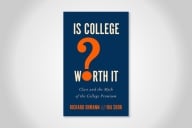You have /5 articles left.
Sign up for a free account or log in.
Up until roughly the beginning of May, I had done a decent job of fulfilling my New Year’s resolution. During the past year, while I found myself working as a visiting assistant professor at a small East Coast college, I had resolved to stop reading the well-meaning but panic-inducing chronicles of down-and-out academics.
The constant cavalcade of spooky tales about Interfolio errors, pernicious search committees and tragic interview mishaps had, in fact, proved detrimental to my psychological health, and ultimately served to substantiate my biggest fear: the academic job market was indeed as bad as it seemed, if not worse.
By May, the academic job-hunting season was quickly drawing to a close. Still without a contract for the coming school year, my professional life appeared discouragingly similar to one of those dour blog posts written by eager but unlucky educators I had so valiantly sworn off in January.
Disheartened, I again turned to that most faithful therapist of unemployed scholars everywhere: Dr. Google, Psy.D. Still as reliable as I had remembered, the good doctor quickly found Jonathan Wynn’s “The Longest Job Visit,” published in Inside Higher Ed in May.
Wynn’s harrowing account of the vicissitudes of the academic job market struck a nerve. On one hand, his words were nothing new: the never-ending glut of unhappy academics has easily translated into a surplus of sad personal accounts of professional travails on websites such as Slate, The Chronicle of Higher Education and Salon.
Nevertheless, Wynn’s piece remains a high-water mark for such articles. As he bravely shares, the historian balanced teaching and publishing and even signed a book contract as he spent six long years in various visiting positions.
This past academic year I, too, had experienced firsthand the perverse numbers game that Wynn wrote so honestly about. Besides keeping pace with the rigors of teaching, I sent out 190 applications, participated in countless Skype interviews and did a handful of campus visits that crisscrossed the continental forty-eight.
That May, as I stared down the grim prospect of retreating, jobless and exhausted, to my parents’ Midwestern basement, Wynn’s article provided a modicum of solace. Others had weathered the same reversals I had and re-emerged, hardened but unrelinquished.
A few days later, I received the congratulatory telephone call that, to put it mildly, made my year. I would have a teaching position for the coming academic year.
Empathy and Advice
Although Dr. Google, Psy.D., is somewhat successful in providing us with a forum for the airing of grievances and exercising empathy, the doctor is more circumspect as a counselor.
That is, obtaining cogent advice on how to make the most out of your VAP stint is not just a mouse click away. Moreover, academe’s constant focus on securing a tenure-track position seemingly detracts from the exchange of information regarding best practices during a VAP.
Having secured a position for next year, here I offer the readers of Inside Higher Ed what could be thought of as a visitor’s guide. Following these steps in no way guarantees a favorable outcome. But it is a start.
- First and foremost, find a mentor, if not multiple mentors. Preferably someone who is tenured, loves his or her job, and is brave enough to provide young scholars with constructive criticism. In this regard, I was very lucky; my mentor was all these things and much more. A mentor should do a few things for you. First, your mentor should observe your class early in the year and be willing to add a letter of recommendation to your Interfolio account. This letter should evidence your excellence in the classroom and your professional demeanor and note that you are an active participant in the academic life of the institution. During the second half of the year, after you have garnered student evaluations, this letter should be updated.
- As a VAP, you should be receptive to whatever constructive criticism, observations and advice your colleagues and mentors can offer you. Make known that you would love their input, receive it graciously and take it seriously. If your mentor and/or your colleagues are willing to revise your professional cover letter and give you feedback, do not pass up on this generous offer.
- Look for opportunities to present your scholarship in front of your new colleagues. At the small liberal arts college where I was a VAP, the provost hosted low-pressure but thoughtful faculty lunch talks on a weekly basis. Again, ask for constructive criticism, but also show yourself to be a serious scholar. After all, publications are a trump card, even at teaching-heavy institutions.
- Seek out other professors whose scholarly and teaching interests jibe with your own. Show an interest in their work and leave open the possibility for future collaborations. Ask them about what kind of texts, student projects and exams work best at the institution. Also, ask about what doesn’t work.
- Although some educators are (perhaps rightfully) wary about sharing syllabi with their colleagues, certainly be receptive to those colleagues who are not. Every institution is different and syllabi -- more often than not -- reflect the culture of the place.
- If at all possible, take on a role as coordinator for a multisection course. If you are allowed, make minor but pedagogically sound changes to the syllabus. During interviews with search committees, talk with specificity about the modifications you have made and be able to justify why you made them.
- Establish with your mentor or department head what modifications can be made to syllabi. Since full-time faculty are oftentimes busy with committee obligations or are focused on teaching upper-level courses, adjunct faculty are a great source of information about the multisection, elementary-level courses you may be teaching. Talk to your secretary about who among the adjunct instructors would be a good contact. As a visiting instructor, you need to discern as soon as possible if exams and essays for multisection courses are standardized across sections.
- Constantly ask yourself what your VAP experience means in terms of your scholarship, your pedagogy and your administrative know-how. Burnish gems of wisdom before your (hopefully many) interviews. Are you learning new technological skills? Are you teaching different books? Are you working with students on novel collaborative projects?
- Make sure your department’s website lists you as a professor. If possible, include your updated CV so that search committees are aware of your most recent professional activities.
- On the first day of class, ask your students to fill out a questionnaire that includes such questions as: Do you work? If so, how many hours a week? What do you like to do in your free time? What do you hope to get out of this class? Give them the option to respond anonymously if they wish; the idea is to learn about the overall culture of your new institution. Every school has a particular ethos and environment. Such a questionnaire will allow you to get a read on your new students quickly.
- Take a keen interest in the administrative affairs of your institution, but be aware of your status as contingent faculty. Above all, be a keen listener.
- Do your best to attend functions organized by students and fellow professors; participate generously in the life of the institution.
- Keep smiling at students and at school staff.
- If you take on a visiting position away from home or without your significant other, make sure to participate in nonneurotic hobbies. It will be a lonely, trying year. Learning how to do macramé, for example, may not provide you with the opportunity to meet new people. Ditto for extreme couponing. During my VAP experience, I took salsa dancing lessons, which got me out of the house, away from my grading and moving my routinely sedentary body.
- Most importantly, remember the worth of humility and the value of higher education.
Admittedly, this visitor’s guide is a work in progress. After all, this coming academic year, I will reprise my role as a VAP -- although at a different institution.
That said, I hope that in the next new year, we can resolve to not only to sympathize with each other via the Internet but also to guide each other through this longest of job visits. Empathy undoubtedly soothes. But advice, in the best of cases, can inspire.








